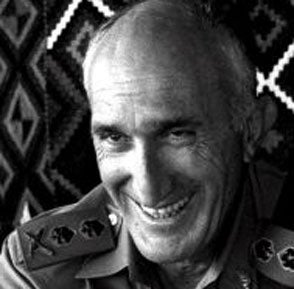Lt-Gen Moshe Levy: 'Solid' Israeli Chief of Staff

Moshe Levy, army officer: born Tel Aviv, Palestine 1936; Chief of General Staff, Israel 1983-87; married Raya Halperin (five children); died Afula, Israel 7 January 2008.
Moshe Levy was a rarity among Israeli supreme commanders: strong and silent, even-tempered and composed, a soldier's soldier, with neither charisma nor political aspirations. He was appointed Chief of Staff in 1983, after what Israelis now call the First Lebanon War. It was a bad time for the army, which had not lost the war, but had not won it either.
Ariel Sharon, the defence minister, had been forced to resign after the Sabra and Shatila massacre of Palestinian refugees by Israel's Maronite surrogates in 1982. Rafael Eitan, whose term as Chief of Staff was coming to an end, was severely censured, but allowed to go quietly. Levy's brief was to rebuild the army's confidence.
During his four-year term, he did so without controversy, withdrawing his troops to a security zone in southern Lebanon, where they stayed until 2000. Moshe Arens, the new defence minister who gave Levy the job, recalled: "When he was appointed, he said to me: 'I hope I don't disappoint you.' He never did." According to Hirsh Goodman, a journalist who had served under Levy in the paratroops during his national service, "They wanted somebody solid, with his feet on the ground and no political ambitions or affiliations. He got the army back on track."
Less well known is the fact that, while serving as Deputy Chief of Staff during the war, Levy played a key part in stopping Sharon and Eitan sending their tanks into Muslim West Beirut behind the back of Menachem Begin, the ailing prime minister. Levy, who feared that Israel would suffer heavy and unnecessary casualties, leaked their scheme to military correspondents, who alerted their political contacts. Begin vetoed the invasion.
Moshe Levy was born in Tel Aviv in 1936, the son of Iraqi immigrants. He was the first Chief of Staff of Middle Eastern origin and the first who had learned his soldiering in the Israel Defence Forces rather than the pre-state militias. He was mobilised in 1954, serving first in the infantry then the paratroops. He dropped in the Mitla Pass in a celebrated, but ill-fated raid during the 1956 Suez War.
As a career officer, nicknamed "Moshe and a Half" because of his height (two metres), Levy rose steadily through the ranks. After the 1967 Six-Day War, he proved his talents as commander of the volatile Jordan Valley front. Uzi Eilam, another future general who served as his deputy, wrote:
We knew Yasser Arafat intended to build up his terrorist capability by sending in gunmen and weaponry from Jordan. It was a life and death struggle, and officers who led the chases after the infiltrators often paid the ultimate price. It was clear that new tactics had to be developed for a new type of warfare . . . Levy improved the brigade's fighting capabilities and was a major contributor to restoring and then maintaining high morale.
Levy followed a familiar career path as the army's head of operations, chief of Central Command and Deputy Chief of Staff. After 33 years in uniform, he retired to his home in Kibbutz Beit Alfa in the Jezre'el Valley, where his wife Raya had been born and brought up.
Eric Silver
Join our commenting forum
Join thought-provoking conversations, follow other Independent readers and see their replies
Comments
Bookmark popover
Removed from bookmarks